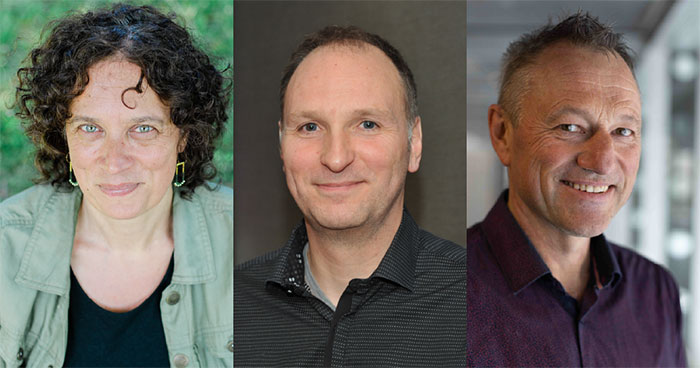Creation of a philanthropic chair for a smoother transition to carbon neutrality
April 9, 2025
HEC Montréal, Polytechnique Montréal and Université de Montréal are joining forces to create a philanthropic chair for a smoother transition to carbon neutrality: the Trottier Chair in Energy Transition, Governance and Participation. This initiative will receive $1.5 million in funding over five years.
The goal of the newly created research group is to identify, understand, and anticipate the sticking points that will arise along the path to carbon neutrality, from a social, environmental, political, economic, and technical perspective. The group will also develop methods to mitigate the impacts of the transition to carbon neutrality, to not only facilitate adherence to the change, but to also accelerate the transition.
Donation from the Trottier family

Laurence Bherer, Michaël Kummert and Emmanuel Raufflet
The Trottier Chair has been made possible by a donation from the Trottier Family Foundation, which also led to the creation of the Institut de l'énergie Trottier (IET). The Trottier Foundation is actively engaged in the fight against climate change by supporting innovative, independent, and interdisciplinary research projects. This new chair furthers its mission to promote a sustainable future by focusing on science, transdisciplinarity and the mobilization of knowledge.
Bringing together political science, engineering and management
The Chair's work will be structured around three research axes, each led by one of the joint holders of the Chair:
- Laurence Bherer, Professor in the Department of Political Science at Université de Montréal,
- Michaël Kummert, Professor in the Department of Mechanical Engineering at Polytechnique Montréal, and
- Emmanuel Raufflet, Professor in the Department of Management at HEC Montréal.
As the work progresses, bridges will be built between the three research groups to cultivate a systemic understanding of the transition and develop combined solutions.
Proactive governance axis
Laurence Bherer's team will develop proactive governance approaches to help governments make better decisions, taking into account the impact on future generations. By devising scenarios for institutional reforms, this approach will guide public policy and strengthen citizen participation, fostering a long-term collective vision of the socio-ecological transition.
Energy modelling axis
Michaël Kummert's team will focus on energy modelling, by creating models to simulate transition trajectories at different scales. These simulations will quantify the impact of the scenarios and technological choices on emissions, costs and peak electricity demand, thereby helping decision-makers avoid unexpected effects.
Inclusivity axis
Emmanuel Raufflet's team at HEC Montréal will focus on inclusive transition management, i.e., on the ways and means of including organizations and field actors in the transition efforts. This involves taking local realities into account, listening to marginalized voices and ensuring a fair transition. The team will also examine how organizations can integrate these changes into their daily practices, by combining performance and social justice.
More information on the Trottier Chair in Energy Transition, Governance and Participation
Learn more about the joint holders
